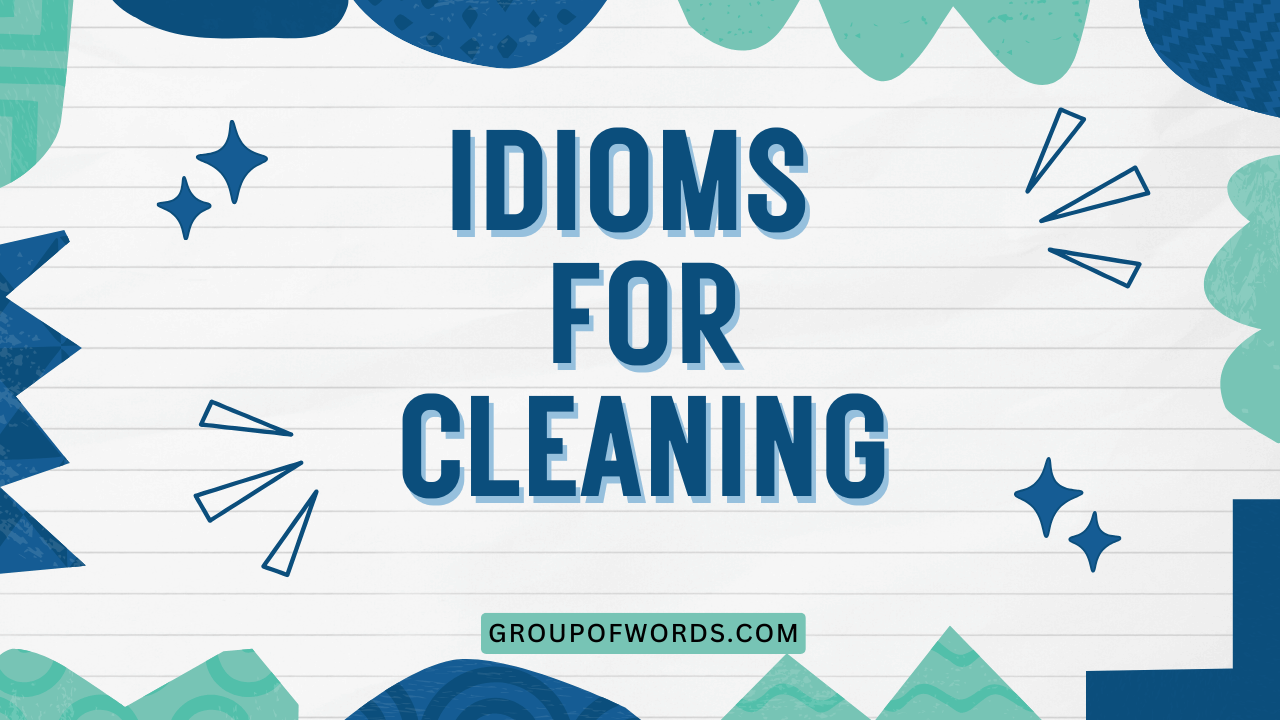Cleaning Up Your Language: Mastering Idioms About Cleaning
Idioms add color and depth to the English language, allowing us to express ideas in creative and nuanced ways. When it comes to describing the act of cleaning, a surprising number of idioms exist, each with its own unique connotation.
Understanding these idioms can significantly enhance your comprehension of both spoken and written English, particularly in informal contexts. This article provides a comprehensive guide to idioms related to cleaning, covering their meanings, origins, and usage.
This guide is perfect for English language learners aiming to improve their vocabulary, native speakers looking to refine their understanding of idiomatic expressions, and anyone interested in the fascinating world of language.
Table of Contents
- Introduction
- Definition of Idioms for Cleaning
- Structural Breakdown of Cleaning Idioms
- Types and Categories of Cleaning Idioms
- Examples of Cleaning Idioms
- Usage Rules for Cleaning Idioms
- Common Mistakes with Cleaning Idioms
- Practice Exercises
- Advanced Topics in Cleaning Idioms
- Frequently Asked Questions
- Conclusion
Definition of Idioms for Cleaning
An idiom is a phrase or expression whose meaning cannot be understood from the ordinary meanings of the words in it. It’s a figurative way of speaking where the intended meaning differs from the literal meaning of the words used.
Idioms related to “cleaning” extend this concept to actions beyond simply removing dirt. They can refer to tidying, concealing, or even making metaphorical changes.
The function of idioms is to add color and expressiveness to language. They allow speakers to convey complex ideas in a concise and memorable way.
Cleaning idioms, in particular, often evoke a sense of order, renewal, or deception, depending on the specific idiom used. The context is crucial for understanding the intended meaning.
These idioms appear frequently in informal conversations, literature, and media. They’re less common in formal writing, where precision and clarity are paramount.
Recognizing and understanding cleaning idioms is essential for comprehending the nuances of everyday English.
Structural Breakdown of Cleaning Idioms
Structurally, cleaning idioms can be categorized based on their grammatical construction. Many involve verbs directly related to cleaning, such as “clean,” “sweep,” “wash,” or “scrub.” These verbs are often combined with prepositions or adverbs to create idiomatic meanings.
Other idioms use seemingly unrelated words to convey a sense of cleanliness or order.
The pattern often involves a verb + preposition combination (e.g., “clean up,” “sweep under the rug”) or a verb + object + preposition combination (e.g., “wash your hands of”). Some idioms are phrases or clauses that function as a unit (e.g., “a clean slate”).
Understanding the grammatical structure can help learners identify and interpret new idioms. By recognizing the common patterns, it becomes easier to infer the meaning of unfamiliar expressions.
However, memorization and exposure to various contexts remains crucial for mastering idiomatic language.
Types and Categories of Cleaning Idioms
Cleaning idioms can be grouped into several categories based on their meanings and connotations. Here are some common categories:
Idioms for General Cleaning
These idioms refer to the act of making something tidy or presentable, without necessarily implying a deep or thorough cleaning. They often describe superficial improvements or minor adjustments.
Idioms for Thorough Cleaning
This category includes idioms that suggest a complete and comprehensive cleaning, leaving no trace of dirt or imperfection. These idioms often imply a more significant effort or a higher standard of cleanliness.
Idioms for Hiding Something
These idioms involve concealing or covering up something, often with the intention of deceiving or avoiding consequences. They often have negative connotations, suggesting dishonesty or a lack of transparency.
Idioms for Starting Over
This category includes idioms that describe the act of beginning anew, often after a mistake or failure. They imply a fresh start and the opportunity to learn from past experiences.
Examples of Cleaning Idioms
The following tables provide examples of cleaning idioms categorized by their meaning. Each example is presented with its meaning, a sentence demonstrating its usage, and a brief explanation of the context.
General Cleaning Examples
This table provides examples of idioms related to general cleaning.
| Idiom | Meaning | Example Sentence | Explanation |
|---|---|---|---|
| Clean up | To make a place tidy. | Please clean up your room before dinner. | Refers to tidying a room. |
| Tidy up | To make something neat. | I need to tidy up my desk before I can start working. | Similar to “clean up,” but often implies a smaller area. |
| Dust off | To remove dust from something. | I need to dust off my old books. | Can also mean to revive something old. |
| Spruce up | To make something look neater or more attractive. | We need to spruce up the garden before the party. | Implies making something look more presentable. |
| Wipe down | To clean a surface with a cloth. | Wipe down the counters after you finish cooking. | Refers to cleaning a surface. |
| Give something a once-over | To quickly examine or clean something. | I’ll give the kitchen a once-over before the guests arrive. | Implies a quick and superficial cleaning. |
| Straighten up | To make something tidy or organized. | Straighten up your clothes before you leave the house. | Similar to “tidy up,” but often focuses on alignment. |
| Pick up | To lift things from the floor or ground to tidy a space. | Could you pick up your toys, please? | Often used when asking someone to tidy scattered items. |
| Do the dishes | To wash the plates, glasses, and cutlery after a meal. | I’ll do the dishes after you cook dinner. | A common household chore. |
| Run a vacuum | To clean a carpet or floor with a vacuum cleaner. | I need to run a vacuum in the living room. | Refers to using a vacuum cleaner. |
| Mop the floor | To clean a floor with a mop. | She mopped the floor after the spill. | Refers to cleaning a floor with a wet mop. |
| Swab the deck | To wash the deck of a ship (historically). | The captain ordered the crew to swab the deck. | More generally means to clean thoroughly. |
| Clean house | To remove unwanted or undesirable elements. | The new CEO promised to clean house and get rid of inefficient departments. | Often used in business contexts. |
| Wash up | To wash one’s hands and face. | Please wash up before dinner. | Refers to personal hygiene. |
| Sweep the floor | To clean a floor with a broom. | I need to sweep the floor in the kitchen. | Refers to using a broom. |
| Polish something off | To finish something quickly and easily. | He polished off the cleaning in just a few hours. | Implies completing a task efficiently. |
| Clear the table | To remove dishes and utensils from the table after a meal. | Can you clear the table after dinner? | A common task after eating. |
| Do the laundry | To wash clothes. | I need to do the laundry this weekend. | Refers to washing clothes. |
| Mend fences | To repair relationships after a disagreement. | After their argument, they needed to mend fences. | Figuratively cleaning up a relationship. |
| Put in order | To organize. | I need to put my thoughts in order before the meeting. | Arranging things in a logical manner. |
Thorough Cleaning Examples
This table provides examples of idioms related to thorough cleaning.
| Idiom | Meaning | Example Sentence | Explanation |
|---|---|---|---|
| Spring cleaning | A thorough cleaning done in the spring. | We do a spring cleaning every year to get rid of clutter. | Implies a deep and comprehensive cleaning. |
| Scrub clean | To clean something vigorously with a brush and water. | I scrubbed the floor clean after the party. | Implies a lot of effort. |
| Clean as a whistle | Completely clean. | The kitchen was as clean as a whistle after she finished. | Implies a very high standard of cleanliness. |
| Squeaky clean | Extremely clean; also, morally pure. | The car was squeaky clean after the car wash. | Can also imply honesty and integrity. |
| Go over with a fine-tooth comb | To examine something very carefully and thoroughly. | The auditors went over the accounts with a fine-tooth comb. | Implies a very detailed examination. |
| Leave no stone unturned | To do everything possible to find something or solve a problem. | The detectives left no stone unturned in their investigation. | Implies a comprehensive search. |
| Get down and dirty | To work hard and thoroughly, often in a messy or unpleasant way. | We had to get down and dirty to finish the project on time. | Implies hard work and dedication. |
| Pull out all the stops | To do everything possible to succeed. | They pulled out all the stops to win the competition. | Implies using every available resource. |
| Turn something upside down | To search thoroughly and completely. | I turned the house upside down looking for my keys. | Implies a chaotic and thorough search. |
| Wash something out | To remove a stain or dirt by washing. | I hope I can wash out this stain from my shirt. | Refers to removing a stain. |
| Make a clean sweep | To remove or eliminate everything completely. | The new manager made a clean sweep of the department. | Implies a complete removal. |
| Root out | To find and get rid of something undesirable. | The company is trying to root out corruption. | Implies a systematic removal. |
| Scrub up | To wash one’s hands and arms thoroughly before surgery. | The surgeon scrubbed up before the operation. | Specific to medical contexts. |
| Leave no trace | To remove all evidence of something. | The spies were trained to leave no trace. | Implies a complete concealment. |
| Get rid of | To eliminate or discard something. | I need to get rid of these old clothes. | Implies removing something unwanted. |
| Sort out | To organize or resolve a problem. | We need to sort out these issues before moving forward. | Implies organizing or resolving. |
| Cleanse | To purify or clean thoroughly. | The ritual was meant to cleanse the soul. | Often used in a spiritual or metaphorical sense. |
| Purge | To remove something completely. | The dictator ordered a purge of his enemies. | Implies a violent or forceful removal. |
| Sanitize | To make something hygienic. | We need to sanitize the kitchen regularly. | Implies making something safe for use. |
| Disinfect | To kill bacteria or viruses. | Disinfect the surface to prevent the spread of germs. | Implies killing harmful microorganisms. |
Hiding Something Examples
This table provides examples of idioms related to hiding something.
| Idiom | Meaning | Example Sentence | Explanation |
|---|---|---|---|
| Sweep under the rug | To hide a problem or mistake and pretend it doesn’t exist. | The company tried to sweep the scandal under the rug. | Implies concealing a problem. |
| Cover up | To conceal a mistake or crime. | They tried to cover up the evidence. | Implies concealing evidence. |
| Whitewash | To conceal faults or errors. | The report was a whitewash designed to protect the company. | Implies concealing faults. |
| Paper over the cracks | To hide problems temporarily rather than solving them. | The government is just papering over the cracks in the economy. | Implies a temporary solution. |
| Bury the hatchet | To make peace after a disagreement. | After years of feuding, they decided to bury the hatchet. | Implies ending a conflict. |
| Brush under the carpet | Similar to “sweep under the rug,” to ignore or hide a problem. | The issue was brushed under the carpet to avoid embarrassment. | Implies ignoring a problem. |
| Mask | To conceal or disguise something. | He tried to mask his disappointment with a smile. | Implies concealing emotions or intentions. |
| Camouflage | To hide something by disguising its appearance. | The soldiers camouflaged their vehicles. | Implies disguising something to blend in. |
| Conceal | To keep something secret or hidden. | He tried to conceal his true feelings. | Implies keeping something secret. |
| Hide one’s light under a bushel | To keep one’s talents and abilities hidden. | She was hiding her light under a bushel by not sharing her ideas. | Implies not showcasing one’s abilities. |
| Keep under wraps | To keep something secret until a later time. | The project is being kept under wraps until the official announcement. | Implies keeping something secret temporarily. |
| Muffle | To suppress or conceal something. | He tried to muffle the sound of his footsteps. | Implies suppressing something. |
| Obscure | To make something unclear or difficult to see. | The fog obscured the view. | Implies making something unclear. |
| Screen | To hide or protect something. | The trees screened the house from the road. | Implies protecting something from view. |
| Stash away | To hide something in a secret place. | He stashed away the money in a safe. | Implies hiding something for safekeeping. |
| Keep something close to one’s chest | To keep something secret or private. | He kept his plans close to his chest. | Implies keeping something private. |
| Play one’s cards close to one’s chest | To be secretive about one’s intentions. | She was playing her cards close to her chest during the negotiations. | Implies being secretive during a negotiation. |
| Under the table | Secretly or unofficially. | The deal was done under the table. | Implies something done secretly. |
| Behind closed doors | In private or secretly. | The meeting was held behind closed doors. | Implies a private meeting. |
| Cover one’s tracks | To hide evidence of one’s actions. | The thief tried to cover his tracks. | Implies hiding evidence of wrongdoing. |
Starting Over Examples
This table provides examples of idioms related to starting over.
| Idiom | Meaning | Example Sentence | Explanation |
|---|---|---|---|
| Clean slate | A fresh start, free from past mistakes. | The new year is a chance to start with a clean slate. | Implies a fresh beginning. |
| Wipe the slate clean | To forget past mistakes and start fresh. | Let’s wipe the slate clean and try again. | Implies forgiving past errors. |
| Turn over a new leaf | To change one’s behavior for the better. | He decided to turn over a new leaf and quit smoking. | Implies a positive change in behavior. |
| Start from scratch | To begin something again from the beginning. | The project failed, so we had to start from scratch. | Implies starting over completely. |
| Go back to the drawing board | To start planning something again because the first plan failed. | The design didn’t work, so we had to go back to the drawing board. | Implies replanning after a failure. |
| Reinvent oneself | To change one’s life or appearance completely. | After the divorce, she decided to reinvent herself. | Implies a complete personal transformation. |
| New beginning | A fresh start or opportunity. | Moving to a new city was a new beginning for her. | Implies a fresh opportunity. |
| Second chance | An opportunity to try again after failing. | He was grateful for the second chance. | Implies an opportunity to redeem oneself. |
| Fresh start | A new opportunity to begin something. | The new job gave him a fresh start. | Implies a new opportunity. |
| Begin anew | To start something again. | They decided to begin anew after the setback. | Implies starting over. |
| Put the past behind you | To forget about past events and move forward. | It’s time to put the past behind you and focus on the future. | Implies moving on from the past. |
| Start over from zero | To begin again from the very beginning. | The business failed, so they had to start over from zero. | Implies starting from nothing. |
| Erase the past | To forget or eliminate past events. | He wished he could erase the past. | Implies wanting to forget the past. |
| Turn the page | To move on to a new chapter in life. | It’s time to turn the page and start a new chapter. | Implies moving forward in life. |
| Start with a blank canvas | To begin something without any preconceptions or limitations. | The artist started with a blank canvas. | Implies a completely open beginning. |
| Open a new chapter | To begin a new phase in life. | Moving abroad meant opening a new chapter in her life. | Implies starting a new phase. |
| Reset | To set something back to its original state. | He had to reset the computer after the crash. | Implies returning to a default state. |
| Reboot | To restart something, often a computer. | I need to reboot the system to fix the problem. | Implies restarting a system. |
| Second bite at the cherry | A second chance to do something. | He got a second bite at the cherry when the company rehired him. | Implies a second opportunity. |
| Mulligan | A free shot or attempt, often in golf. | He asked for a mulligan after his bad shot. | Implies a free attempt. |
Usage Rules for Cleaning Idioms
Using cleaning idioms correctly requires understanding their specific meanings and contexts. Some idioms are more formal than others, and some are specific to certain regions or dialects.
Pay attention to the nuances of each idiom to avoid miscommunication.
Consider the audience and the situation when using idioms. In formal settings, it’s generally best to avoid idioms altogether and use more direct language.
In informal conversations, idioms can add color and expressiveness, but overuse can make your speech sound unnatural.
Be mindful of the literal meaning of the words in the idiom. While the intended meaning is figurative, the literal meaning can still influence how the idiom is perceived.
Choose idioms that are appropriate for the topic and tone of the conversation.
Common Mistakes with Cleaning Idioms
One common mistake is misinterpreting the meaning of an idiom due to its literal interpretation. For example, understanding “sweep under the rug” as actually sweeping something under a rug, rather than hiding a problem.
Another mistake is using an idiom in an inappropriate context. For example, using a very informal idiom in a formal presentation can sound unprofessional.
Using idioms out of context can lead to confusion and miscommunication. Here are some examples of common idiom mistakes:
| Incorrect | Correct | Explanation |
|---|---|---|
| “I’m going to sweep the problem with the rug.” | “I’m going to sweep the problem under the rug.” | Misunderstanding the preposition. |
| “The house is clean as a shout.” | “The house is clean as a whistle.” | Incorrect idiom. |
| “Let’s wash the slate shiny.” | “Let’s wipe the slate clean.” | Incorrect verb and adjective. |
| “He turned a new leaf over.” | “He turned over a new leaf.” | Incorrect word order. |
| “She’s as clean as a pin.” | “She’s squeaky clean.” | While ‘clean as a pin’ is a valid idiom, it doesn’t carry the same weight as ‘squeaky clean’ in some contexts. |
| “They are papering on the cracks.” | “They are papering over the cracks.” | Incorrect preposition. |
| “We need to dust the book off.” | “We need to dust off the book.” | Incorrect word order. |
| “I will do the vacuum.” | “I will run the vacuum.” | Incorrect verb choice. |
| “He is hiding his candle under a bushel.” | “He is hiding his light under a bushel.” | Incorrect noun choice. |
| “They are starting from the ground.” | “They are starting from scratch.” | Incorrect idiom. |
Practice Exercises
Test your understanding of cleaning idioms with these exercises. Each exercise focuses on a different aspect of idiom usage.
Exercise 1: Fill in the Blanks
Complete the sentences with the correct cleaning idiom from the list below.
Idiom List: clean up, sweep under the rug, clean slate, spring cleaning, clean as a whistle
| Question | Answer |
|---|---|
| 1. Let’s start the new year with a __________. | clean slate |
| 2. Please __________ your room before your friends arrive. | clean up |
| 3. The company tried to __________ the scandal __________. | sweep, under the rug |
| 4. We do a __________ every year to get rid of clutter. | spring cleaning |
| 5. The kitchen was __________ after she finished. | clean as a whistle |
| 6. The politician hoped to ______ his image after the scandal. | clean up |
| 7. It’s best not to ______ problems ______; address them directly. | sweep, under the rug |
| 8. After the argument, they decided to put aside their differences and start with a ______. | clean slate |
| 9. This year’s ______ will involve decluttering every room in the house. | spring cleaning |
| 10. The operating room needs to be ______ before the surgery. | clean as a whistle |
Exercise 2: Matching
Match the idiom with its correct meaning.
| Idiom | Meaning | Answer |
|---|---|---|
| 1. Wash your hands of | a. To start something again from the beginning | 1-d |
| 2. Go back to the drawing board | b. To make something look neater | 2-e |
| 3. Spruce up | c. To examine something very carefully | 3-b |
| 4. Start from scratch | d. To disclaim responsibility for something | 4-a |
| 5. Go over with a fine-tooth comb | e. To start planning again after a failed attempt | 5-c |
| 6. Clean house | f. To purify or clean thoroughly | 6-h |
| 7. Sort out | g. To make peace after a disagreement | 7-i |
| 8. Cleanse | h. To remove unwanted or undesirable elements. | 8-f |
| 9. Bury the hatchet | i. To organize or resolve a problem | 9-g |
| 10. Get rid of | j. To eliminate or discard something | 10-j |
Exercise 3: Sentence Completion
Choose the best idiom to complete each sentence.
| Question | Options | Answer |
|---|---|---|
| 1. After the company’s failure, they had to __________. | a. clean house b. start from scratch c. sweep under the rug | b. start from scratch |
| 2. The detective promised to __________ to find the missing evidence. | a. leave no stone unturned b. clean as a whistle c. wash his hands of | a. leave no stone unturned |
| 3. The politician tried to __________ the corruption scandal. | a. turn over a new leaf b. sweep under the rug c. scrub clean | b. sweep under the rug |
| 4. He decided to __________ and start exercising regularly. | a. clean up b. turn over a new leaf c. wipe the slate clean | b. turn over a new leaf |
| 5. The auditor __________ the financial records before approving the deal. | a. went over with a fine-tooth comb b. cleaned as a whistle c. washed his hands of | a. went over with a fine-tooth comb |
| 6. The boss decided to ______ and fire all the unproductive employees. | a. clean house b. wipe the slate clean c. sweep under the rug | a. clean house |
| 7. After their big fight, the two countries decided to ______. | a. sweep under the rug b. bury the hatchet c. start from scratch | b. bury the hatchet |
| 8. We need to ______ the storage room; it’s a mess! | a. sort out b. sweep under the rug c. wash our hands of | a. sort out |
| 9. The shaman performed a ritual to ______ the village of evil spirits. | a. sanitize b. cleanse c. disinfect | b. cleanse |
| 10. It’s important to ______ your hands regularly to prevent the spread of germs. | a. sweep under the rug b. sanitize c. bury the hatchet | b. sanitize |
Advanced Topics in Cleaning Idioms
For advanced learners, exploring the etymology and cultural context of cleaning idioms can provide a deeper understanding of their meanings. Researching the origins of idioms like “clean as a whistle” or “sweep under the rug” can reveal fascinating insights into their historical and social significance.
Analyzing the use of cleaning idioms in literature and media can also enhance comprehension. Pay attention to how authors and speakers use idioms to convey specific emotions or perspectives.
Consider the impact of idioms on the overall tone and message of the text.
Furthermore, explore regional variations in cleaning idioms. Some idioms may be more common in certain parts of the world, while others may have different meanings depending on the location.
Understanding these variations can help you communicate more effectively with people from diverse backgrounds.
Frequently Asked Questions
Here are some frequently asked questions about cleaning idioms:
- What is the difference between an idiom and a metaphor?
An idiom is a phrase whose meaning is different from the literal meaning of its words, while a metaphor is a figure of speech that directly compares two unrelated things. Idioms are often fixed expressions, while metaphors can be
fixed or newly created.
- How can I improve my understanding of idioms?
Read widely, listen to native speakers, and pay attention to context. Keep a notebook of new idioms and practice using them in your own speech and writing.
- Are cleaning idioms common in all English-speaking countries?
While many cleaning idioms are widely understood, some may be more common in certain regions or dialects. Be aware of regional variations and adapt your language accordingly.
- Is it appropriate to use idioms in formal writing?
In general, it’s best to avoid idioms in formal writing, where precision and clarity are paramount. Use more direct and literal language to convey your meaning.
- How can I avoid misusing idioms?
Pay close attention to the specific meaning and context of each idiom. If you’re unsure about the meaning or usage of an idiom, look it up in a dictionary or ask a native speaker.
- Why are idioms important in language learning?
Idioms add color and expressiveness to language. Understanding idioms can significantly enhance your comprehension of both spoken and written English, particularly in informal contexts.
- Can I create my own idioms?
While it’s possible to create new expressions, idioms are generally established phrases that have gained widespread acceptance. It’s best to focus on learning and using existing idioms correctly.
- How do I know when to use an idiom?
Consider your audience, the context, and the tone of the conversation. If you’re unsure whether an idiom is appropriate, it’s best to err on the side of caution and use more direct language.
- What resources can help me learn more about idioms?
Dictionaries, online resources, and language learning websites can provide definitions, examples, and usage tips for idioms. Practice exercises and quizzes can also help you test your understanding.
- Are there any idioms that should be avoided?
Some idioms may be considered offensive or insensitive, depending on the context and audience. Be mindful of the potential impact of your words and avoid using idioms that could be hurtful or disrespectful.
Conclusion
Mastering cleaning idioms can significantly enhance your understanding and use of the English language. By learning the meanings, origins, and usage rules of these expressions, you can communicate more effectively and expressively.
Remember to consider the context and audience when using idioms, and practice regularly to improve your fluency. With dedication and effort, you can “clean up” your language skills and achieve a deeper appreciation for the richness and diversity of the English language.
Keep practicing and exploring new idioms to continuously improve your linguistic abilities. The world of idioms is vast and fascinating, offering endless opportunities for learning and growth.






